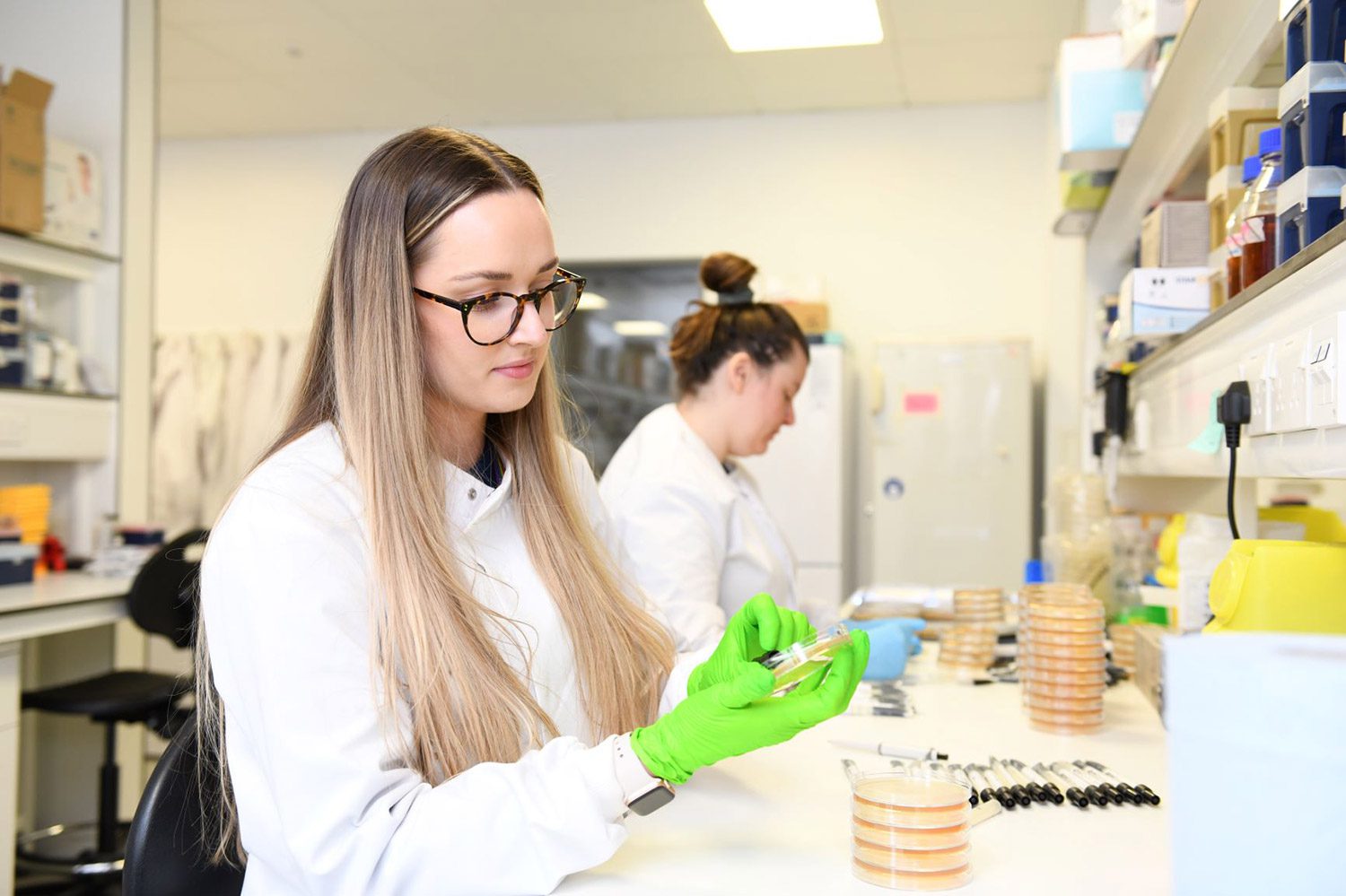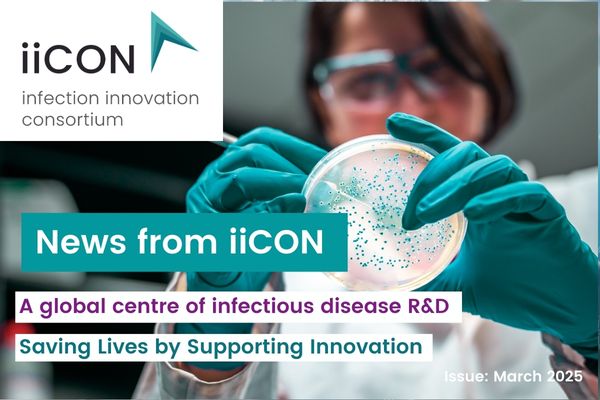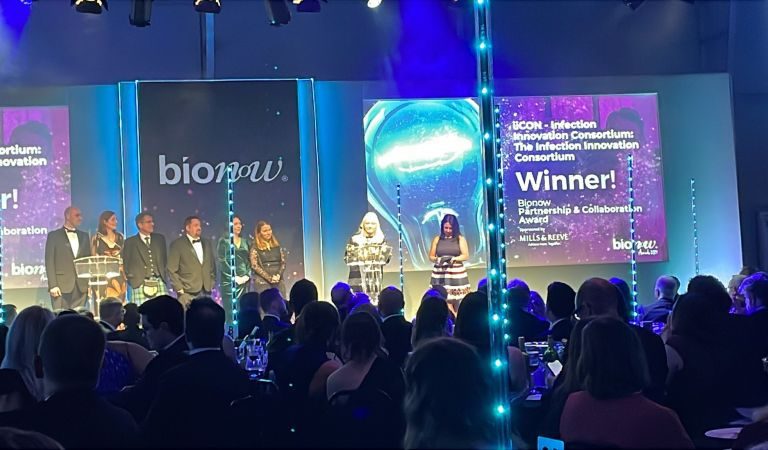- Join the Innovation Journey
- Our Platforms
iiCON supports dozens of life-saving solutions in first three years

In just three years, the Infection Innovation Consortium: iiCON has helped launch a long list of new medical innovations which have had a significant impact on the global health landscape.
iiCON, a consortium led by Liverpool School of Tropical Medicine (LSTM) with core partners LifeArc, Unilever, Evotec, Liverpool University Hospitals Foundation Trust, University of Liverpool, and Infex Therapeutics. It brings together industry, academia, and clinicians to accelerate the discovery, development and deployment of new treatments and products to prevent and treat infectious disease – saving and improving millions of lives through collaborative innovation.
Founded in 2020 with an £18.6 million government grant provided through UK Research and Innovation’s flagship Strength in Places Fund, iiCON has already helped a total of 36 new products enter the market. This has resulted in more than five billion units of new personal hygiene products, medical devices, vaccines and other disease prevention products being provided to patients and populations.
The innovations iiCON has supported cover a wide variety of technologies and therapies, ranging from new sensors that can detect when the right amount of insecticide has been sprayed on a wall to surface coatings that reduce the risk of patients or the general public contracting serious infections.
Despite being launched when the COVID-19 pandemic was already underway, iiCON still played a significant role in the global vaccine development. Datasets generated by iiCON were used for international approval of the Oxford-AstraZeneca Covishield COVID-19 human vaccine.
iiCON’s SME support programme enabled SME innovations to play a key role in the global battle to combat COVID. The consortium supported Merseyside business Bio Data Networks Limited to develop a new device to detect outbreaks of COVID-19 and other infectious diseases across communities via a sewage monitoring system. MAST, another Merseyside SME, was helped through the same programme to take its COVID-19 diagnostic test to the market.
Alongside new drugs and medical devices, iiCON’s work has involved important education initiatives. This includes the Liverpool Vaccine Equity programme, which resulted in a 20% increase in COVID-19 vaccine uptake in three different hard to reach population groups within the city.
iiCON is also actively unlocking development obstacles for new drugs and vaccines that will be needed in the event of future pandemics. This includes proving the efficacy of a new device to move Monkey Pox (Mpox) samples quickly and safely between labs and collaborating with Pfizer and MSD to refine vital pneumococcal vaccine development via a novel human challenge model created by LSTM in partnership with iiCON.
The consortium is now working with a global network of hundreds of companies of all sizes – driving forward pioneering innovation by helping companies to access world-leading infectious disease research facilities and expertise from its partners.
The success of iiCON’s activity has seen it grow into a c£200 million infectious disease R&D programme. The programme has attracted significant support from prestigious global organisations including The Bill and Melinda Gates Foundation, Against Malaria Foundation, The Wellcome Trust, and the Medical Research Council. This growth is underlined by a new partner recently being brought onboard, the medical research organisation, LifeArc, which will add further funding, expertise and capacity into the programme, in particular through a new Antibody Humanisation platform.
iiCON is a core component of the UK Government’s Investment Zone programme, where the second Zone in Health and Life Sciences will be based within the Liverpool City Region. This ecosystem has thrived in the region over the last three years thanks to iiCON’s work, with £223 million of additional investment generated for infection R&D in the North West.
The programme is also supporting and strengthening the region’s world-leading capability in infectious disease R&D by driving close collaboration and partnership-working across key centres of excellence. It has created or secured 278 jobs in the infection control sector and more than 50 SMEs in the Merseyside area have benefited from iiCON’s ERDF funded SME support programme.
Professor Janet Hemingway, founding director of iiCON, said: “Despite only launching three years ago, we have surpassed many of the targets we’d set ourselves. We’ve started to drive the regional R&D investment target from its base of £2 billion per annum to £3 billion by 2030 and have become a leading centre of innovation in the UK aimed at tackling the world’s most critical infection related health challenges. This has led to iiCON becoming the nucleus of a rapidly developing infection ‘Super Cluster’ in the North West.
“One of the main yardsticks by which we can judge the efficacy of iiCON’s work is the fact that so many incredible projects that are benefiting from our support are already having a global health impact.
“We achieve this by bridging the gaps between multiple stakeholders to discover and develop new anti-infectives, diagnostics, and preventative products. Our pipeline of new concepts is incredibly strong, so we’re looking forward to bringing forward more impactful products that will further enhance our ability to control and treat infections across the global health landscape.”
Steve Rotheram, Mayor of the Liverpool City Region, said: “From the world’s first school dedicated to researching tropical medicine to saving and improving millions of lives through collaborative innovation, few places can claim to have made a bigger impact on global health than ours.
“I’m incredibly proud of our region’s legacy in infectious disease control – but I’m not content with resting on our laurels. I want to catapult our area to the forefront of UK science and innovation and take advantage of the thousands of jobs and training opportunities it will bring to our area. iiCON will have a significant role to play in helping us achieve that target and I’m looking forward to watching it continue to grow and expand.”


